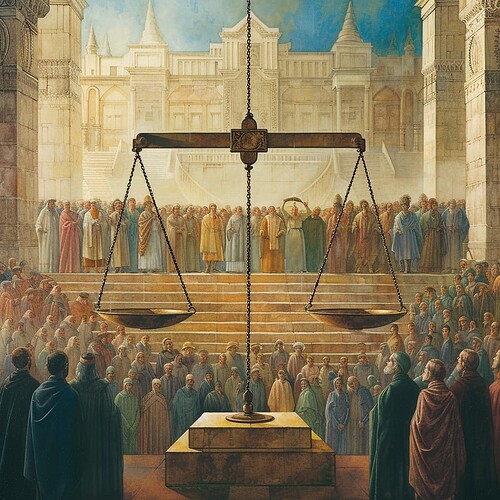![]() February 12: Psalm 75, 76 - Embracing God’s Judgement and Peace
February 12: Psalm 75, 76 - Embracing God’s Judgement and Peace
![]() Introduction:
Introduction:
Diving into the canticles of the Psalter, we unravel a fabric of intimate worship and robust theology. Psalm 75 and 76 offer profound vistas of God as both judge and peace-giver.
![]() Psalm 75: God The Ultimate Judge
Psalm 75: God The Ultimate Judge
Psalm 75 starts with thankfulness for God’s wondrous works and proclaims His name. As the psalm progresses, it acknowledges God as the final arbiter of justice.
![]() Key Verse: “But God is the judge: he putteth down one, and setteth up another.” (Psalm 75:7, KJV)
Key Verse: “But God is the judge: he putteth down one, and setteth up another.” (Psalm 75:7, KJV)
![]() This verse reminds us that God is sovereign, the ultimate authority in all decisions, and we can trust His judgement.
This verse reminds us that God is sovereign, the ultimate authority in all decisions, and we can trust His judgement.
![]() Psalm 76: God The Peace-Bringer
Psalm 76: God The Peace-Bringer
As we traverse Psalm 76, we find God depicted as a mighty warrior. This intense psalm illustrates God’s dominance over earthly powers and instilling peace.
![]() Key Verse: “Thou art more glorious and excellent than the mountains of prey.” (Psalm 76:4, KJV)
Key Verse: “Thou art more glorious and excellent than the mountains of prey.” (Psalm 76:4, KJV)
![]() This verse echoes the omnipotence and glory of God – a source of peace, strength and hope for us.
This verse echoes the omnipotence and glory of God – a source of peace, strength and hope for us.
![]() Key Themes and Reflections:
Key Themes and Reflections:
-
Sovereignty of God: Through both psalms, we traverse the valleys and peaks of God’s sovereignty – the divine authority to both judge and gift peace.
-
Thankfulness: In every situation -either trial or peace-, gratitude pervades these psalms, expressing awe for God’s actions.
![]() Today’s Application:
Today’s Application:
Let’s cultivate an attitude of gratitude while remembering God’s sovereignty in our lives. We can express this by praying for peace, trusting in His judgement, and thanking Him in every situation.
![]() Hidden Gem:
Hidden Gem:
In ancient Hebrew poetry, mountains often symbolised earthly powers. Here, God is portrayed as even more ‘glorious and excellent than the mountains of prey’.
![]() Reflective Q&A:
Reflective Q&A:
![]() Why is remembering God’s sovereignty important in our lives?
Why is remembering God’s sovereignty important in our lives?
A: Remembering God’s sovereignty reassures us that no matter what we experience, God’s will is ultimately at work for our good.
![]() What is the significance of expressing gratitude in every situation?
What is the significance of expressing gratitude in every situation?
A: Expressing gratitude helps maintain a positive and optimistic outlook, even in challenging times. It also reminds us of God’s unwavering presence in our lives.
![]() Join the Discussion:
Join the Discussion:
Share with us – how has acknowledging God’s sovereignty and expressing gratitude affected your life journey?
![]() See You Tomorrow in Psalm 77, 78:
See You Tomorrow in Psalm 77, 78:
Mining metaphors and unraveling God’s wonders - join us tomorrow as we continue our journey through the Psalms.
From judgment to peace, sovereignty to thanksgiving - every verse of Psalms 75 and 76 urges us to pause, reflect, and refill our spiritual reservoirs. So, let’s continue this rich exploration of the Psalms, tracing God’s footprints in our lives.
